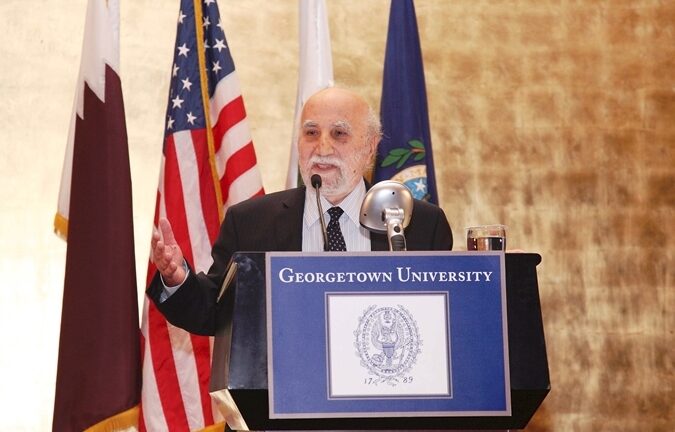American Studies, Dialogue Series, Regional Studies
Fouad Ajami Lectures on the Arab Spring

On November 21, 2011, CIRS hosted Fouad Ajami, a Senior Fellow of The Hoover Institution at Stanford University and co-chairman of Hoover’s Working Group on Islamism and the International Order, to discuss the recent Arab Spring in the Middle East. The event which was sponsored by Georgetown’s Center for International and Regional Studies (CIRS) took place at the university’s campus, and drew a large number of members from the Doha community.
The lecture, titled “Tracking the Arab Spring: The Best Day After a Bad Emperor is the First,” explored how the “Arab Awakening” started in Tunisia, went on to Egypt, then to many other countries, including Syria and Libya. Ajami described how the Arab Spring started with Mohamed Bouazizi, a Tunisian street vendor, whose act became the catalyst for the Tunisian revolution that led to the stepping down of their former president and the spreading of riots to different countries in the Arab world.
“Arabs, for several decades walked by the wall and did nothing against these tyrannical regimes, but now they are eager to take their freedom and full rights… Luckily, now they decided not to heed and react to these regimes,” said Ajami while addressing the audience.
According to Ajami, who is a frequent contributor on Middle Eastern issues and contemporary international history for The New York Times, Foreign Affairs, The New Republic, The Wall Street Journal, among many other journals and periodicals.
“I am all in with the Arab Spring, I believed in it and still do; however, I am really worried about Egypt… If the Arab awakening did not succeed in Egypt, it will definitely affect the political, social, and economic situations in the other Arab countries… The economic freedom is linked to the political one; there is no political freedom in the absence of economic freedom,” he explained. Ajami believes that there will be a time when Arabs will chant in support of a great leader.
The event concluded with a question and answer session which generated a great deal of participation from the audience, whose members posed a range of questions for the speaker.
Georgetown University’s CIRS hosts a variety of regional and international experts through its Distinguished Lecture Series. Former speakers include prominent Middle East news correspondent Robert Fisk and Pulitzer Prize-winning author Thomas L. Friedman. These lectures are designed to raise awareness of regionally-relevant international issues.
Georgetown’s Center for International and Regional Studies in Qatar is a premier research institute devoted to the academic study of regional and international issues. CIRS sponsors a number of forums throughout the year facilitating dialogue and an exchange of ideas on a broad range of issues with the aim to engage and enrich the university students and community.
From 1980 to June 2011, he was the Majid Khadduri professor and Director of Middle East Studies at The Johns Hopkins School of Advanced International Studies. He began his academic career after receiving his PhD in political science from the University of Washington in 1973. He is the author of The Arab Predicament, The Vanished Imam, Beirut: City of Regrets, and The Dream Palace of the Arabs, The Foreigner’s Gift: The Americans, the Arabs and the Iraqis in Iraq and other works.